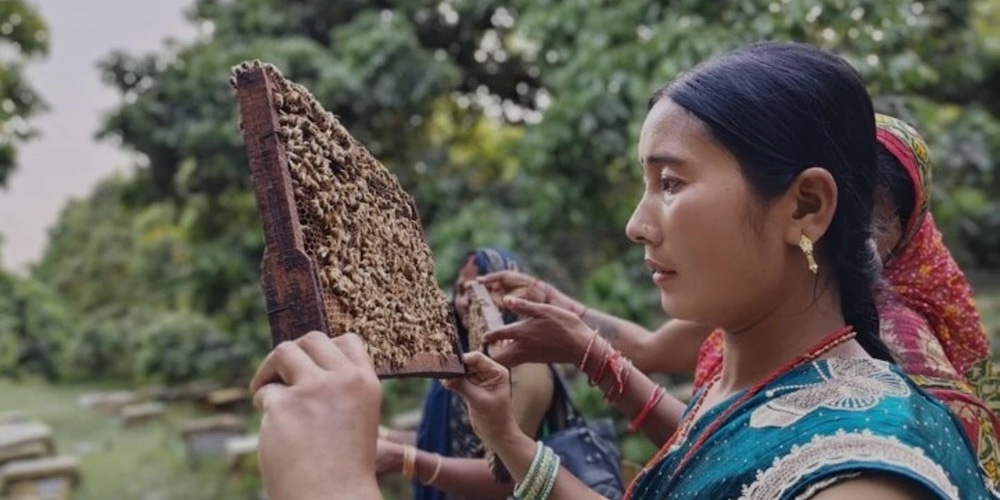India’s “Sweet Revolution”

India has made a remarkable leap in the global honey market, emerging as the world’s second-largest exporter of natural honey. In the fiscal year 2023–24, India exported about 1.07 lakh metric tonnes (MT) of natural honey worth $177.55 million, a dramatic rise from its ninth-place ranking in 2020, according to an official statement issued on November 2.
This achievement is largely credited to the National Beekeeping and Honey Mission (NBHM) — a Central Sector Scheme launched under the government’s “Sweet Revolution” initiative. The mission aims to promote scientific beekeeping (apiculture), improve honey quality, and raise farmers’ incomes. India’s diverse agro-climatic zones make it particularly well-suited for large-scale beekeeping and honey production, fueling the country’s export momentum.
Implemented through the National Bee Board (NBB), the NBHM scheme was announced under the banner of Atmanirbhar Bharat with a total budget outlay of ₹500 crore for three years (FY 2020–21 to 2022–23). It has since been extended for another three years (FY 2023–24 to 2025–26) with a remaining budget of ₹370 crore from the original allocation.
Beekeeping, an agro-based activity undertaken by farmers and landless labourers in rural areas, forms an integral part of the Integrated Farming System. It plays a crucial role in pollination, thereby enhancing crop yields and farmers’ income while providing honey and other high-value beehive products such as beeswax, bee pollen, propolis, royal jelly, bee venom, etc., all of which serve as important sources of livelihood for rural communities.
Integrated farming (or integrated agriculture) is a commonly and broadly used word to explain a more integrated approach to farming as compared to existing monoculture approaches. It refers to agricultural systems that integrate livestock, fisheries, crop production, horticulture, etc.
India’s diverse agro-climatic conditions offer vast potential for beekeeping, honey production, and export. Recognizing its importance in rural development and agricultural sustainability, the Government of India launched the NBHM as part of the “Sweet Revolution”, an ambitious initiative aimed at promoting apiculture to accelerate the production of quality honey and boost farmers’ income through scientific and organized beekeeping.
The NBHM is being implemented through 3 Mini Missions (MMs) – MM-I, MM-II & MM- III:
Mini Mission-I: Under this Mission, thrust will be given on production & productivity improvement of various crops through pollination assisted by adoption of scientific beekeeping;
Mini Mission-II: This Mission will concentrate on post-harvest management of beekeeping/beehive products including collection, processing, storage, marketing, value addition, etc. with a thrust to develop requisite infrastructural facilities for these activities; and

Mini Mission-III: This Mission will concentrate on research & technology generation for different regions/states/agro-climatic and socio-economic conditions.
The main objectives of NBHM are:
• Promoting holistic growth of beekeeping industry for income & employment generation, providing livelihood support to farm and non-farm households and to enhance agriculture/ horticulture production;
• Developing additional infrastructural facilities for developing quality nucleus stock of honeybees, multiplication of stock by bee breeders and post-harvest and marketing infrastructures, including honey processing plants, storages/cold storages, collection, branding, marketing centre, etc.;
• Setting up of state-of-the-art Quality Control Labs for testing of honey & other beehive products at regional levels and Mini/Satellite Labs at district levels in main honey producing districts/states;
• To develop blockchain/ traceability system for traceability of source of honey & other beehive products and using IT tools in beekeeping, including online registration, etc.;
• To develop and facilitate Honey Corridors in potential areas;
• To promote agri-entrepreneurs & agri-startups for their involvement in beekeeping/honey production;
• To promote trade-agreements between beekeepers & traders/honey processors/exporters, etc.;
• To promote, develop and disseminate latest technologies and skill development in beekeeping industry for production of honey & other high value beehive products;
• Empowerment of women through beekeeping
• To maximize, economic, ecological and social benefits by diversification through beekeeping by production of higher quantity and good quality of honey and other high value beehive products for domestic and export market; and
• To strengthen beekeepers by developing an institutional framework through collective approach like formation of Self-Help Groups/Farmer Producer Organizations / Beekeepers Cooperatives / Federations, etc.
As per the July 2025 Monthly Dashboard for Honey, prepared jointly by the Agricultural and Processed Food Products Export Development Authority (APEDA) and Crisil, globally, India is the second largest exporter of honey, after China, as of marketing year 2024, up from the 9th rank in 2020.


